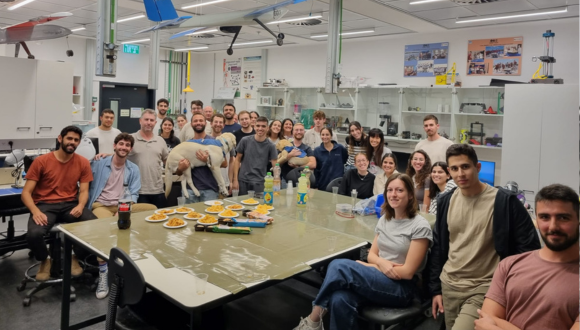Tauver
Tauver is a project born from the Tel Aviv University's Space Club, aiming to promote and make the Israeli space industry more accessible to students.
The goal of the project is to represent Israel annually in international competitions in the fields of space and robotics. In its first year, the pilot goal is to become the first Israeli team to participate in the European Rover Challenge (ERC), which will take place in Poland at the end of August 2025. The team consists about 40 students from Tel Aviv University across various faculties—Engineering, Exact Sciences, Computer Science, Mathematics, and more.
The ERC is the largest rover design competition in Europe, where student teams from around the world compete in various tasks. The overarching mission is to design and build a fully functional rover. The teams receive tasks based on real challenges that space agencies have encountered in the past, aiming to find innovative solutions for space exploration problems.
This year's challenges focus on Mars settlement and include:
- Navigation Task – The rover must autonomously navigate a designated field.
- Science Task – The rover must collect a prove containing an unknown material and analyze it to identify as many details as possible using a modular experimental setup.
- Mechanical Task – The rover must perform "repairs" on a mechanical panel, including flipping switches, connecting plugs, pressing buttons in a sequence, and more.
- Sample Collection Task – The rover must collect various soil samples (one probe, a surface sample, and a drilled sample).
- Drone Task – In addition to the rover, each participating team must bring a drone capable of autonomous flight and perform a navigation task like that of the rover.
Judges from the European Space Agency (ESA), NASA, and other globally renowned organizations will attend and evaluate the competition. Additionally, successful designs have the potential to be launched into space or sold to companies in the industry.
The project receives full support from Tel Aviv University, including:
- Allowing some students to use their work on the rover systems as a final engineering project.
- Financial support – An initial budget of ₪45,000 provided by the university.
- A dedicated lab was established for working on the rover project.
- Access to the university’s official media channels for project promotion.
- Collaboration with faculty members for mentorship.
The team is divided into 9 sub-teams, each with a mentor from the industry or academia, providing continuous guidance in their respective fields. Some of the mentors include:
- Yigal Harel, Co-Founder of WeSpace
- Reut Sorek Avramovitz, Founder of Starstone
- Aviv Kenelbaum, Senior Systems Engineer at the Israel Aerospace Industries (IAI) Space Division
In addition to university support, several organizations are collaborating with the project, including:
- Rakia – Providing workspace access, expert consultations, and event funding.
- Creation-Space – Offering free company services and assistance with fundraising.
- Weizmann Institute – Assisting in experimental setup and donating components.
- Soreq Institute – Donating advanced materials and components.
Project Status
The team has been actively working for the past three months. Before the upcoming academic exam period, purchase requests were made for major rover components (such as the main computer, autonomy cameras, and drive motors), and a Preliminary Design Review (PDR) event was held with all teams. (A presentation with key slides is attached.)


